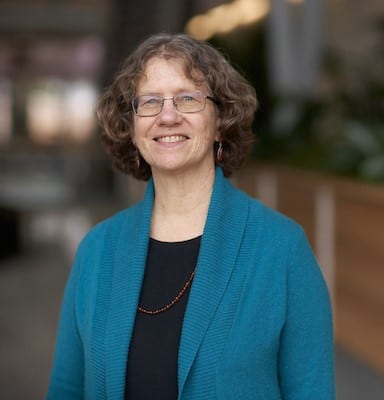
Elizabeth Kellogg, PhD
Donald Danforth Plant Science Center
Member and Robert E. King Distinguished Investigator
Expertise:
BotanyBotanycomparative genomicscomparative genomicsPlantsSystematics
Elizabeth Anne Kellogg is an American botanist who now works mainly on grasses and cereals, both wild and cultivated. She earned a Ph.D. from Harvard University in 1983 and was a professor of Botanical Studies at the University of Missouri - St. Louis from September 1998 to December 2013. Since 2013 been a Principal Investigator at the Donald Danforth Plant Science Center in Missouri. In 2020 she was elected a member of the National Academy of Sciences. Elizabeth has spent her career studying cereal crops and their wild relatives in the grass family, plants on which all of civilization depends. Her unique contribution has been to forge connections between scientists in the front lines of biodiversity research and those breaking new ground in genetic and genomic studies. The Kellogg lab’s work identifies deep similarities among plants as apparently disparate as rice, wheat, maize, and the other cereals. Because similarity and difference are two sides of the same coin, in the process they have also discovered genes that contribute to the diversity of the great cereals of the world. Members of the Kellogg lab believes that food security is a human right, and that plant scientists have an obligation to contribute to feeding the growing global population. This is central to the mission of the Center, to “feed the hungry and improve human health.” Cereal crops in the grass family – including rice, maize (corn), wheat, sorghum, barley, and oats – have fed civilizations for millennia, and are the center of our research. These crops were selected by humans from an entire ecosystem of wild grasses, which dominate and more than ¼ of the land area of the earth. By studying how the wild plants grow, make seeds, and adapt to drought and floods, we can learn how to make more resilient crops. Conversely, by studying cereal crops, we can predict how wild grasses may adapt to a warmer, drier climate. This aspect of our work reflects the second part of the Center’s mission, to “preserve and renew environment.” The third part of the mission is to “enhance the St. Louis region as a world center for plant science.” As you can see in the descriptions of projects below, the lab is a small business supported by grant funding, much of which represents federal tax dollars brought home to Missouri. Like the other labs in the Center, we are an employer, a small business that keeps the economic engine of the city running. Current projects in the Kellogg lab include: Adaptation and morphological evolution in the tribe Andropogoneae. This project is supported by two NSF grants, one of which is producing genomes for as many members of the tribe as possible (see panandropogoneae.com), and the other of which is using those data to investigating evolution of floral and inflorescence structures. Evolution of grass abscission zones. We have discovered that the mechanisms controlling how seeds fall off the plant are surprisingly diverse. This poses mechanistic and evolutionary questions that we are pursuing in wild species and related crops.
No Research/Citations
Dr. Elizabeth "Toby" Kellogg Receives the 2021 Asa Gray Award Recognizing a Lifetime of Achievements
Elizabeth "Toby" Kellogg, PhD, Member and Robert E. King Distinguished Investigator, Donald Danforth Plant Science Center recently received the 2021 Asa Gray Award from The American Society of Plant Taxonomists (ASPT).
28-Oct-2021 10:45:38 AM EDT

Danforth Center Principal Investigator Elected to the National Academy of Sciences
The Donald Danforth Plant Science Center announced that Elizabeth (Toby) Kellogg, Ph.D., Robert E. King Distinguished Investigator and member of the Danforth Center, was elected as a member of the U.S. National Academy of Sciences in recognition of her distinguished and continuing achievements in original research.
28-Apr-2020 12:15:51 PM EDT
It’s been said that there are only two kinds of organisms in the world: plants and plant parasites. All life depends on plants.
-